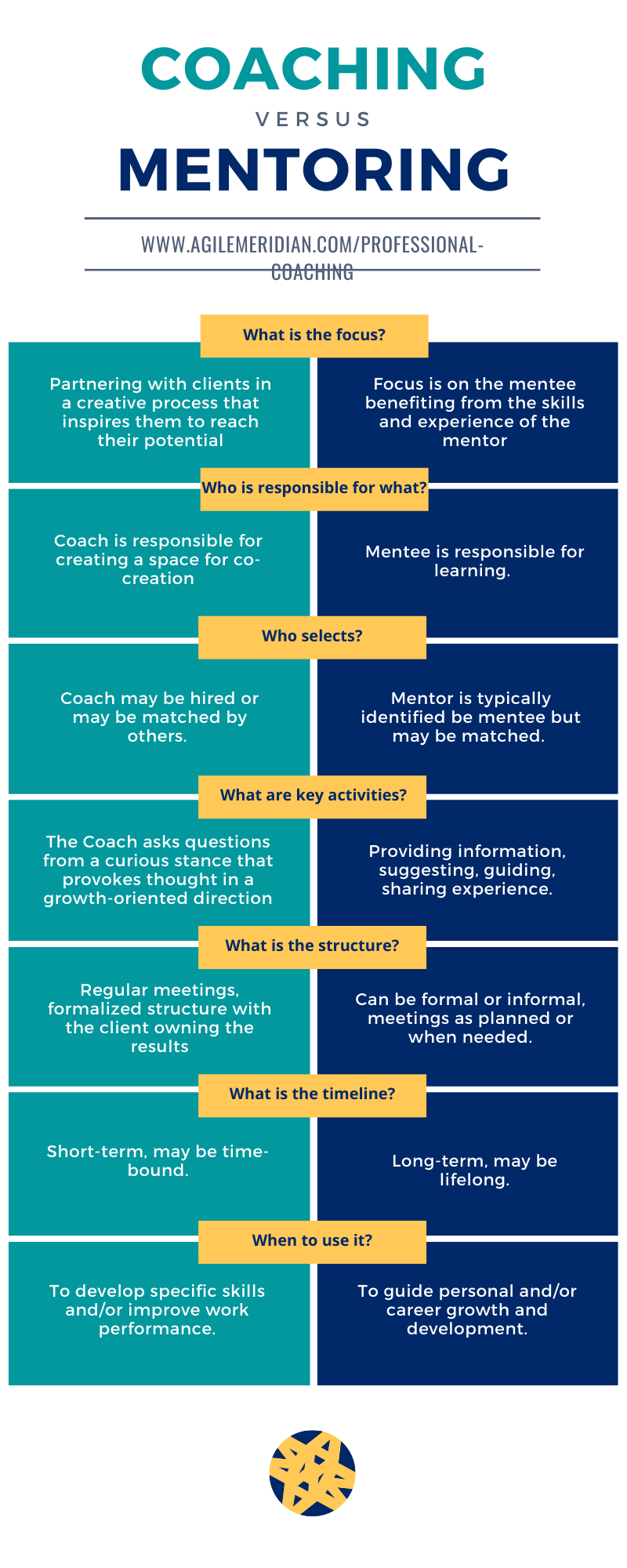Robust Theme
Dec 09, 2019 2020-04-08 7:40Robust Theme
Coaching vs. Mentoring

By: Kumar Dattatreyan
What do these two terms mean?
Let there be no confusion a coach and a mentor are different and are not interchangeable terms! So let's break down the definitions of them both.
Coaching: A coach refers to someone who provides guidance to a person or client on their goals and helps them reach their full potential.
Mentoring: A mentor refers to someone who shares their knowledge, skills, and/or experience to help another develop or grow.
How is each used?
When you think about a coach, what comes to mind? Usually, the typical answer I get is that of a sports coach who "coaches" and guides his or her team to greatness. Is this coaching? Let's see what the definition from the ICF (International Coaching Federation) is for coaching:
"ICF defines coaching as partnering with clients in a thought-provoking and creative process that inspires them to maximize their personal and professional potential. The process of coaching often unlocks previously untapped sources of imagination, productivity and leadership".
What do you think? Personally, I was a sports coach, and I don't recall it being all that creative a process, however, I suspect that there are some coaches who can do this. For me, coaching mostly fits the definition from the ICF, and I personally love the partnering aspect of coaching to help an individual reach their potential.
What about Mentoring? How is mentoring different from coaching? WELL...Let's explore that by seeing how they vary across scenarios.
What is the focus?
- Coaching: Partnering with client in a creative process that inspires them to reach their potential.
What does this mean? Coaches help the client determine their path forward, without revealing their own biases in the process. If asked by the client, or with the clients permission, the coach may offer mentoring advice based on their experience, however the focus is helping the client realize their own path forward and help them to hold themselves accountable to it. - Mentoring: Focus is on the mentee benefiting from the skills and experience of the mentor
The Mentor/Mentee relationship is a longer lasting relationship than coaching. Think of the Master/Apprentice (or the Jedi Master/Padawan as an analogy to the Mentor/Mentee. The master craftsman passes his skills and experience to the mentee over a period of time, imparting knowledge, wisdom and advice.
Can a Mentor also coach? Of course! Many of the same skills apply and the mentor may use powerful questions, helping the mentee see their own path while helping and guiding them with their experience.
Who is responsible for what?
- Coaching: Coach is responsible for creating a space for co-creation
The coach creates the environment, the client creates the outcome. That to me is the role of a coach, to create a rich and supporting environment that allows the client to see the outcome he's trying to achieve and the path to achieve it. - Mentoring: Mentee is responsible for learning
The mentee owns the learning, while the mentor also creates the space for the mentee to learn. Mentoring is about imparting knowledge in a way that the mentee may benefit and learn from it.
Who Selects?
- Coaching: Coach may be hired or may be matched by others
The client typically chooses the coach they'd like to work with. In some cases, the organization may pick the coach and assign them to the client or may allow the client to pick from several coaches who've been vetted and contracted to provide coaching services to their employees. - Mentoring: Mentor is typically identified be mentee but may be matched
In most cases, the mentee initiates and picks the mentor however, in some cases the organization may have a more formal mentor/mentee program that helps match mentors to mentees
What are the key activities?
- Coaching: The coach asks questions from a curiosity based stance that provokes thought in a growth-oriented direction
"From a curiosity based stance"; that is the key to coaching. Nothing fancy, just stay curious and you can help the client reveal so much to themselves about themselves. The more curious you are as a coach, the more likely you come from a place without judgement. - Mentoring: Providing information, suggesting, guiding, sharing experience
And with mentoring, curiosity definitely helps create the environment more conducive to learning, sharing and guiding through your experience, your wisdom and guidance.
What is the timeline?
- Coaching: Short-term, may be time-bound
Coaching is typically a shorter term endeavor however, people have developed long lasting multi-year engagements with a coach. What's important is that coaching is targeted to help the client achieve a specific outcome and once achieved, the client may terminate or pause the relationship - Mentoring: Long-term, may be lifelong
Mentoring could be much longer, even life long as the relationship between mentor and mentee develops and matures with time. In some cases, mentees may have several mentors, and also may be mentors themselves for others, paying it back in a way.
When to use it?
- Coaching: To develop specific skills and/or improve work performance
As mentioned before, coaching is great at uncovering constraints or blocks that prevent you from achieving the goals in your life or career. It could be a short term engagement to just improve one aspect of work or life, or much longer. - Mentoring: To guide personal and/or career growth and development
While mentoring is longer term and as mentioned may extend to years long relationships.
So, there you have it. There are differences between coaching and mentoring and the skills used are similar between both. The key differences are ones of degree...how much do you mentor while you coach or how much do you coach while you mentor?
And it's not necessarily only the style of the coach or mentor as it depends a lot on the client or mentee; how much do they need coaching or mentoring? Many coaches may balk at mentoring, however, in my view, they go hand in hand, and if my client may benefit from a bit of advice or guidance or my experience, then with their permission, I will gladly share it!


